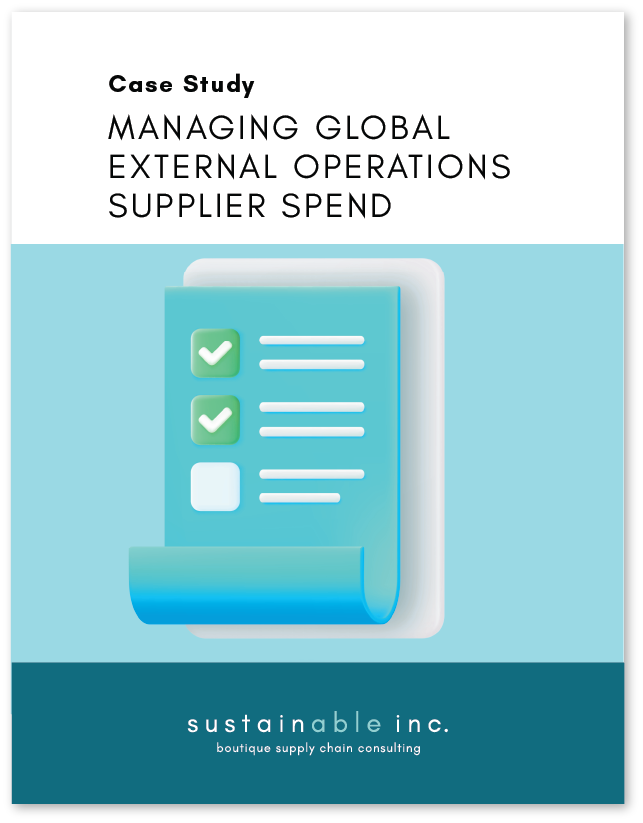Sourcing & Procurement
Transform your purchasing strategy with our innovative approach to category management. By integrating market and business intelligence, we continuously optimize decision-making, strengthen supplier relationships, and create a lasting competitive advantage for your business.
Sustainable inc.’s signature four-step negotiation strategy provides you with the foundation for maximizing the value and minimizing the risk of your supplier contracts in a post-Covid world.

Category Management
By treating each category as a distinct business unit, businesses can develop tailored strategies that optimize sourcing, reduce costs, and improve supplier relationships.
Our supply chain category management services help you streamline procurement, enhance efficiency, and achieve greater value from your supply chain.
-
Cost Reduction: Leverage strategic sourcing and supplier negotiations to achieve significant cost savings.
Enhanced Supplier Relationships: Develop stronger partnerships with suppliers to improve quality, reliability, and innovation.
Improved Inventory Management: Optimize inventory levels to reduce carrying costs and minimize stockouts.
Data-Driven Decisions: Utilize advanced analytics to gain insights into category performance and make informed decisions.
Risk Mitigation: Identify and mitigate risks within the supply chain to ensure continuity and resilience.
-
Comprehensive Assessment: We begin with a detailed assessment of your current category management practices, identifying strengths, weaknesses, and opportunities for improvement.
Customized Strategy Development: Our experts collaborate with you to develop tailored category management strategies that align with your business goals and supply chain requirements.
Supplier Evaluation and Selection: We help you evaluate and select the best suppliers for each category, ensuring optimal performance and value.
Contract Negotiation: Our team assists with negotiating favorable terms and conditions with suppliers to maximize cost savings and minimize risks.
Implementation Support: We provide hands-on support during the implementation phase, ensuring seamless integration of category management strategies into your supply chain operations.
Continuous Improvement: Category management is an ongoing process. We offer continuous monitoring and regular reviews to ensure your strategies remain effective and adaptive to changing market conditions.
In the global marketplace, effective strategic sourcing is essential for businesses looking to gain a competitive edge. By leveraging a global network of suppliers, businesses can access high-quality materials, reduce costs, and minimize supply risk.
Our global strategic sourcing services are designed to help you optimize your supply chain, mitigate risk, and get the best value from your sourcing efforts.
The Power of Global Strategic Sourcing
-
Cost Efficiency: Access competitive pricing by sourcing from a diverse pool of international suppliers.
Quality Improvement: Partner with world-class suppliers to ensure high standards of quality and reliability.
Risk Management: Diversify your supplier base to mitigate risks associated with geopolitical instability, natural disasters, and supply chain disruptions.
Innovation Access: Tap into global innovation and technological advancements by collaborating with leading suppliers worldwide.
Sustainability: Implement sustainable sourcing practices to meet regulatory requirements and enhance your corporate social responsibility.
-
Market Analysis: We start with a comprehensive analysis of the global market, identifying potential suppliers and assessing their capabilities.
Supplier Evaluation: Our team evaluates suppliers based on key criteria such as quality, cost, reliability, and compliance with ethical and environmental standards.
Strategic Planning: Develop and implement strategic sourcing plans that align with your business objectives and leverage global opportunities.
Negotiation and Contracting: Negotiate favorable terms and conditions with selected suppliers to maximize value and minimize risks.
Implementation Support: Provide hands-on support during the implementation phase, ensuring seamless integration of new suppliers into your supply chain.
Ongoing Management: Offer continuous monitoring and management of supplier performance to ensure sustained benefits and address any issues promptly.
Managing supplier contracts effectively is crucial for maintaining compliance, reducing risks, and maximizing the value of your supply chain relationships.
Sustainable inc.’s supplier contract management approach guarantees your contracts are well-structured, compliant, and comprehensively managed post-award.
Contract Management
-
Risk Mitigation: Identify and mitigate risks by ensuring compliance with contractual obligations and regulatory requirements.
Cost Control: Avoid unnecessary costs and penalties through efficient contract management and oversight.
Improved Relationships: Strengthen supplier relationships by clearly defining expectations, performance metrics, and communication channels.
Enhanced Efficiency: Streamline contract processes to improve efficiency and reduce administrative burdens.
Data-Driven Insights: Leverage analytics to gain insights into contract performance and make informed decisions.
-
Contract Review and Analysis: We start by reviewing your existing contracts to identify areas for improvement and ensure compliance with relevant laws and regulations.
Contract Creation: Our team assists in drafting clear, comprehensive contracts that protect your interests and align with your strategic objectives.
Negotiation Support: We provide expert support during contract negotiations to secure favorable terms and conditions with suppliers.
Contract Execution: Ensure smooth execution of contracts through effective communication and collaboration with suppliers.
Monitoring and Compliance: Implement robust monitoring systems to track supplier performance, ensure compliance, and address any issues promptly.
Continuous Improvement: Offer ongoing support and regular reviews to optimize contract management processes and adapt to changing business needs.
By adopting sustainable sourcing practices, companies can reduce their environmental footprint, support ethical practices, and contribute to a healthier planet.
Through our sustainable sourcing program, we help you integrate sustainability into your supply chain, ensuring that your business operates responsibly and ethically.
Sustainable Sourcing
-
Environmental Responsibility: Reduce your environmental impact by sourcing eco-friendly materials and minimizing waste.
Social Impact: Support fair labor practices, human rights, and community development through ethical sourcing.
Cost Savings: Achieve long-term cost savings by improving resource efficiency and reducing waste.
Brand Reputation: Enhance your brand's reputation by demonstrating a commitment to sustainability and corporate social responsibility.
Regulatory Compliance: Ensure compliance with environmental regulations and standards, reducing legal and financial risks.
-
Sustainability Assessment: We begin with a comprehensive assessment of your current sourcing practices to identify opportunities for improvement and sustainability integration.
Strategy Development: Our team collaborates with you to develop a customized sustainable sourcing strategy that aligns with your business goals and sustainability objectives.
Supplier Evaluation: Evaluate and select suppliers based on their environmental and social performance, ensuring they meet your sustainability criteria.
Implementation Support: Provide hands-on support during the implementation phase, ensuring seamless integration of sustainable practices into your supply chain.
Monitoring and Reporting: Implement robust monitoring and reporting systems to track progress, measure impact, and ensure continuous improvement.
Stakeholder Engagement: Engage with stakeholders, including suppliers, customers, and employees, to promote transparency and drive collective action towards sustainability.

Fostering collaborative partnerships, businesses can achieve better quality, cost-efficiency, and can be front runners in innovation.
Utilizing our Supplier Relationship Management services helps build and maintain productive supplier relationships, driving value and performance across your supply chain.
Supplier Relationship Management
-
Enhanced Collaboration: Foster strong, collaborative relationships with suppliers to improve communication and mutual understanding.
Cost Efficiency: Achieve cost savings through strategic negotiations and efficient supplier management practices.
Quality Improvement: Ensure consistent quality by working closely with suppliers to meet and exceed standards.
Innovation and Growth: Drive innovation by leveraging supplier expertise and exploring new opportunities for collaboration.
Risk Mitigation: Identify and mitigate risks by establishing reliable and resilient supplier partnerships.
-
Supplier Segmentation: We start by segmenting your suppliers based on strategic importance, performance, and potential for collaboration.
Performance Evaluation: Conduct comprehensive evaluations of supplier performance using key metrics and benchmarks.
Strategic Collaboration: Develop and implement strategies to foster closer collaboration with key suppliers, ensuring alignment with your business goals.
Communication and Engagement: Enhance communication channels and engage suppliers regularly to address concerns, share insights, and build trust.
Supplier Segmentation
Understanding the different roles and impacts of each supplier, businesses can develop tailored strategies to manage and optimize their supplier relationships.
Our cutting-edge supplier segmentation model helps you better understand where your suppliers fit in your strategic growth plan.
-
Strategic Alignment: Align your supplier management strategies with your business objectives by understanding the varying roles and impacts of different suppliers.
Resource Optimization: Allocate resources effectively by focusing on high-impact suppliers and optimizing management efforts across all segments.
Risk Management: Identify and mitigate risks associated with different supplier segments, enhancing supply chain resilience.
Improved Collaboration: Foster stronger relationships with key suppliers through targeted engagement and collaboration initiatives.
Cost Efficiency: Achieve cost savings by implementing strategic sourcing and negotiation practices tailored to each supplier segment.
-
Comprehensive Assessment: We begin with a thorough assessment of your current supplier base, evaluating each supplier’s performance, risk, and strategic importance.
Segmentation Criteria Development: Develop customized segmentation criteria based on your business needs and industry best practices.
Supplier Categorization: Categorize suppliers into distinct segments such as strategic partners, critical suppliers, and transactional vendors.
Tailored Strategies: Develop and implement tailored management strategies for each supplier segment to optimize performance and collaboration.
Performance Monitoring: Continuously monitor supplier performance and segment status, ensuring ongoing alignment with your business goals.
Continuous Improvement: Provide ongoing support and regular reviews to refine segmentation criteria and management strategies based on evolving business needs.
Managing risks within your supply chain is critical to maintaining operational continuity and achieving business success. By proactively managing these risks, businesses can prevent disruptions, ensure compliance, and protect their brand reputation.
Implementing our supplier risk management models helps you build a resilient and reliable supply chain, safeguarding your operations against potential threats.
Risk Management
-
Operational Continuity: Minimize supply chain disruptions by identifying and mitigating risks early.
Compliance Assurance: Ensure compliance with regulatory requirements and industry standards, reducing legal and financial risks.
Financial Stability: Protect your bottom line by avoiding costly disruptions and supplier failures.
Brand Reputation: Maintain a positive brand image by ensuring ethical and responsible sourcing practices.
Informed Decision-Making: Utilize risk assessments and data analytics to make informed sourcing and procurement decisions.
-
Risk Assessment: We start with a comprehensive assessment of your current supplier base, identifying potential risks related to financial stability, geopolitical factors, compliance, and more.
Risk Categorization: Categorize suppliers based on risk levels and potential impact on your supply chain.
Risk Mitigation Strategies: Develop and implement tailored risk mitigation strategies for high-risk suppliers, ensuring continuity and compliance.
Monitoring and Reporting: Continuously monitor supplier performance and risk factors, providing real-time insights and regular reports.
Crisis Management: Establish robust crisis management protocols to address and resolve supplier-related issues promptly and effectively.
Continuous Improvement: Offer ongoing support and regular reviews to refine risk management strategies and adapt to evolving market conditions.



